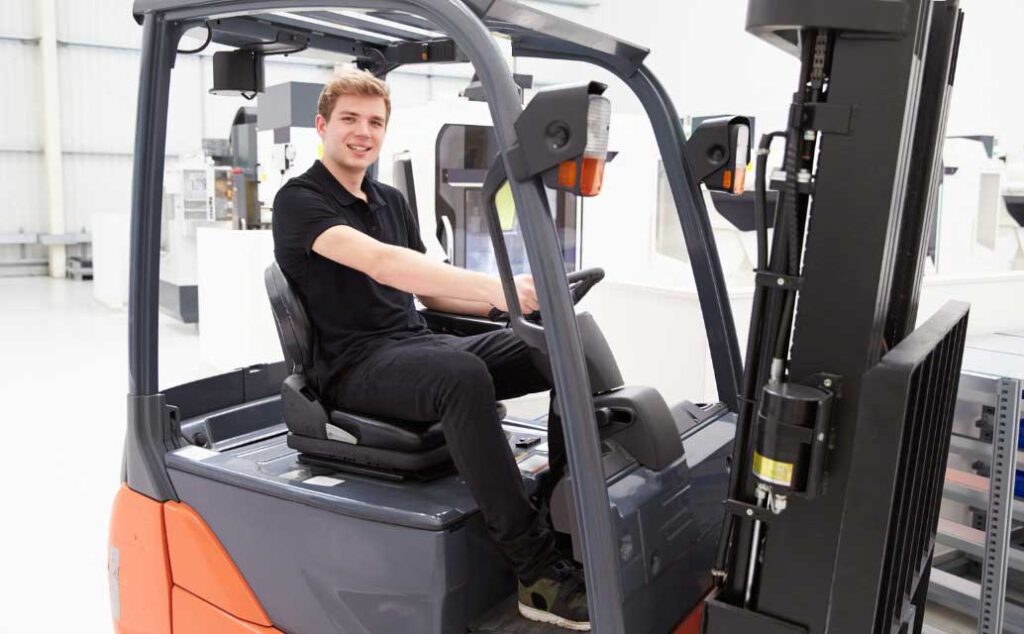Forklift Operators: Ensuring Efficiency and Safety in the Workplace
Forklift operators play an important role in industrial and warehouse environments. These skilled professionals are responsible for operating and maneuvering forklifts to efficiently move heavy materials, products, and equipment across the workplace.
One of the primary reasons forklift operators are essential is their contribution to maintaining workplace efficiency. With their expertise in handling forklifts, they can swiftly transport goods from one location to another, optimizing productivity and reducing downtime. Their ability to load and unload items efficiently helps streamline processes, enabling businesses to meet customer demands more effectively.
Furthermore, forklift operators bear a significant responsibility in ensuring workplace safety. They are trained in the proper handling and operation of forklifts, including navigating through narrow aisles, loading docks, and high shelves. By adhering to strict safety protocols, these operators minimize the risk of accidents, protecting both themselves and their colleagues from potential injuries or property damage.
In addition to operating forklifts safely, these professionals are accountable for conducting routine inspections and maintenance checks on the equipment. By identifying and addressing any issues promptly, they help prevent breakdowns or malfunctioning, further enhancing workplace efficiency.
Necessary Skills and Qualifications
To become a qualified forklift operator, there are several essential skills and qualifications that are necessary. Firstly, proficiency in maneuvering forklifts is crucial. An operator should have the ability to navigate tight spaces, handle uneven terrain, and execute precise movements with ease.
Operating controls effectively is another important skill. Forklifts come with various controls and levers that need to be understood and operated correctly. This includes being proficient in starting and stopping the forklift, controlling its speed, and operating the lifting mechanism.
Understanding load limits is also a key skill for a forklift operator. They should have knowledge of weight capacities and be able to assess the stability of loads. This entails knowing how to properly secure and balance items on the forks to prevent accidents or damage.
Training and certification
Proper training, certification, and ongoing education are crucial to ensure the competence of forklift operators. Training programs cover important aspects such as safety regulations, equipment maintenance, and emergency procedures. It is essential for operators to complete these programs and receive certification to demonstrate their proficiency and understanding of forklift operations.
Additionally, ongoing education is important for operators to stay updated on any changes or advancements in forklift technology and industry standards. This can include attending workshops, seminars, or refresher courses to enhance their knowledge and skills.
Safety Practices and Regulations Safety Practices and Regulations in the USA
Forklift operators play a crucial role in maintaining a safe working environment. Their expertise and adherence to safety practices significantly contribute to preventing accidents and ensuring the well-being of everyone in the workplace.
PPE
Adhering to safety regulations is of utmost importance. Forklift operators must always wear appropriate personal protective equipment (PPE), including helmets, safety shoes, and high-visibility vests. PPE provides protection against potential hazards, such as falling objects or collisions, and ensures the operators’ safety.
Pre-shift inspections
Additionally, conducting pre-shift inspections is a vital safety practice. Operators must thoroughly inspect their forklifts before starting any work. Checking for any mechanical issues, leaks, or damages helps identify and rectify potential dangers, ultimately reducing the risk of accidents.
Loading and unloading procedures
Proper loading and unloading procedures are also essential for maintaining a safe working environment. Operators should follow manufacturer guidelines and best practices when securing loads, utilizing appropriate attachments, and distributing weight evenly. These procedures minimize the risk of tip-overs, collapses, or objects falling while transporting goods.
Vigilance is particularly crucial for forklift operators, especially in crowded areas or when working with hazardous materials. They should constantly be aware of their surroundings, cautiously maneuvering their vehicles to avoid collisions and reduce the chances of injury to themselves or others. When handling hazardous materials, operators must strictly follow safety protocols, such as using designated storage areas, wearing specialized PPE, and properly disposing of waste.
Preventing Accidents and Minimizing Risks Preventing Accidents and Minimizing Risks:
Forklift operations come with their fair share of accidents and hazards that can pose serious risks to both operators and other workers in the vicinity.
Common accidents and hazards associated with forklift operations, as well as outline various preventive measures that can be implemented to minimize these risks:
Tip-overs
These occur when a forklift loses its balance due to improper loading, excessive speed, or uneven surfaces. Tip-overs can result in injuries or fatalities, as well as damage to equipment and property.
Collisions
It can happen when forklifts are not operated in dedicated traffic lanes or when operators fail to maintain a safe distance from other vehicles or objects. Collisions can cause significant damage and injuries. Falling loads are also a hazard, especially when loads are improperly secured or exceed the forklift’s capacity. Workers can be struck by falling loads, resulting in serious injuries.
Preventive measures
To prevent such accidents, it is crucial to ensure proper training for forklift operators. Proper training includes teaching operators about the safe operation of forklifts, load limits, and how to recognize and mitigate potential hazards. Regular equipment maintenance is another preventive measure that should not be overlooked. Forklifts should undergo routine inspections, and any defects or malfunctions should be repaired promptly to prevent accidents.
Clearly marked traffic lanes play a vital role in preventing collisions. Operators should be trained to follow these designated lanes and to always maintain a safe distance from other vehicles and objects. Effective communication among operators and workers is also essential to prevent accidents. It is crucial to establish clear communication protocols, such as using radios or hand signals, to ensure that everyone is aware of each other’s presence and actions.
Importance of Continuous Training and Development
Continuous training and development play a crucial role in the professional growth of forklift operators. It is essential for these operators to constantly enhance their skills and knowledge to ensure safety, efficiency, and effectiveness in their work.
- One of the key reasons why ongoing training and development is important for forklift operators is to stay up to date with the latest industry practices and technological advancements. The field of material handling is constantly evolving, and new equipment, techniques, and safety regulations are introduced regularly. By participating in specialized courses, workshops, and certifications, operators can acquire the necessary knowledge and skills needed to adapt to these changes. This not only ensures their own success but also contributes to the overall productivity and competitiveness of the organization.
- Continuous training and development enable forklift operators to improve their existing skills and acquire new ones. These training programs focus on areas such as proper handling and maneuvering of forklifts, load balancing techniques, maintaining equipment, and understanding safety protocols. By refining their skills in these areas, operators can increase their efficiency, reduce the risk of accidents or damage, and improve overall job performance.
- Forklift operators are responsible for operating heavy machinery and handling potentially dangerous loads. By consistently participating in training programs, operators become more aware of potential hazards, learn how to prevent accidents, and acquire the necessary skills to respond effectively in emergency situations. This not only safeguards the well-being of the operators themselves but also protects the lives and property of others in the workplace.
- Continous training and development also contribute to the professional growth and job satisfaction of forklift operators. Acquiring new certifications or qualifications adds value to an operator’s resume and increases their chances of career advancement. Moreover, the opportunity to learn and develop new skills often leads to higher job satisfaction and motivation among forklift operators.
Future Trends and Technologies
The future of forklift technology is rapidly evolving, with emerging trends that promise to revolutionize the way we handle materials in warehouses and industrial settings. One of the most prominent advancements in this field is the rise of electric forklifts.
Electric forklifts
Electric forklifts have gained popularity due to their numerous advantages over traditional internal combustion engine forklifts. They are not only more environmentally friendly, emitting zero emissions during operation, but they also provide considerable cost savings in terms of fuel and maintenance. Additionally, electric forklifts operate quietly, reducing noise pollution in the workplace.
Automation
With the integration of sensors, cameras, and advanced algorithms, forklifts can now navigate autonomously through aisles and perform tasks with minimal human intervention. This not only increases efficiency but also reduces the risk of accidents caused by human error. Automated forklifts can optimize routes, avoid collisions, and ensure precise positioning, ultimately streamlining operations and saving time.
Artificial intelligence (AI)
By leveraging AI algorithms, forklifts can learn from patterns and make intelligent decisions. For example, AI-powered forklifts can analyze data from sensors and adjust their speed and acceleration based on the load they are carrying, preventing tip-over accidents. AI can also enhance predictive maintenance by analyzing performance data and identifying potential issues before they lead to breakdowns or malfunctions.
As we look to the future, forklift technology will continue to evolve and become smarter. The emergence of electric forklifts, automation, and AI integration is paving the way for safer and more efficient material handling processes in warehouses and industrial settings. By embracing these trends, companies can stay competitive while creating a safer working environment for their employees.
Do you have a system to distribute forklift orders?
If not, then we invite you to look at our easy-to-use mobile Forkfleet system. With it, every forklift operator will know what to do. All operations will take place faster, more conveniently and safely. We invite you to a free presentation of our solution. Find out how, thanks to this system, we save costs and improve the work of operators in firms such as Tenneco, Dayco, ABB, and many others. You too can make the work of forklift operators in your company more efficient. Take advantage of our free consultation.
Why is it worth working with us?
Free audit
During a free consultation, we will listen to your needs. Then we will find and customize a solution that will be effective for you.
No need for integration
The system operates independently of other systems in the company. It does not use the company's network. It does not require involvement of the client's IT department.
Multitasking
The system performs multiple tasks. It assigns tasks to forklift operators, provides analytical data to leaders, organizes and increases the efficiency of intralogistics.
Budget solution
No large initial investment. Settlements in the form of a monthly subscription. Option to cancel at any time.
Proven system
Successfully implemented system for many clients from around the world. In every case of implementation, it resulted in increased efficiency.
Specific savings
Implementing our clients' system reduced forklift fleet costs by an average of 30%. Be the father of financial success in your company. Take advantage of the opportunity for savings!












